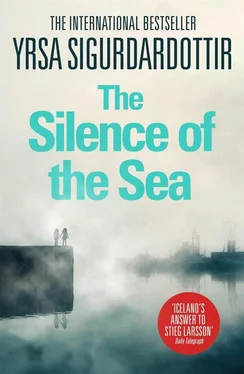‘No, maybe not. But could Karítas have done it?’
‘Oh, do me a favour.’ Snævar looked incredulous. Perhaps he thought women were incapable of stowing away. Or committing murder.
‘Or maybe somebody quite different,’ said Bella.
‘Like who?’
‘Like you.’ As soon as Bella had uttered these words, Thóra felt uncomfortably aware of the smallness of the room and their vulnerability to attack. No doubt Bella had intended it sarcastically; perhaps she had wanted to needle the man sitting opposite them, who was now racking his brains for a suitable reply. But big mouths often blurt out the truth, and all of a sudden Thóra realised that Bella could be right. As far as she knew, no one had checked Snævar’s claim to have flown home, and he could well have been on the yacht, in spite of his broken leg. Her eyes dropped to the plastic splint that projected from under his trouser leg, concealing the cast. From what she could see he was wearing a sock underneath it, and in a flash she understood his reluctance to procure a doctor’s certificate. No doctor with a modicum of self-respect would give a healthy man a certificate confirming that he had a broken leg.
Rarely, if ever, had she been as eager to get outside into the open air.
Thóra had dressed up that morning out of respect for Ægir’s parents, but as she sat at the table in the small kitchen, she realised it would have made no difference what she was wearing. Such matters were trivial in the face of the news she had brought them. The couple sat opposite her, their haggard features expressing a heartfelt wish that she would stop talking; that she would get the harrowing story over with as soon as possible. They listened attentively, saying little, their eyes fixed on the pattern in the tablecloth. Every now and then one of them would adjust the teaspoon in their saucer or smooth out a wrinkle in the cloth, as if the events Thóra was describing were so unreal that they needed to touch something solid to reassure themselves that this was not a bad dream.
‘So, at the end of the day, it all came down to money. I suppose it’s not really surprising.’ Thóra tried to make eye contact but neither of them would look up. ‘There was a fortune on board; millions of US dollars that the owner of the yacht had stashed in the safe. Or so it’s claimed. No money has been found but both Karítas and Snævar swear blind that they didn’t take it because, although they had the security code, they couldn’t open the safe. They may be telling the truth for all we know. I doubt we’ll ever find out. The fact that they didn’t simply program the yacht to sail off into the Arctic Ocean and never be seen again suggests they genuinely believed the money was still on board. They broke in after her arrival in Iceland to make yet another attempt on the safe, but came away empty-handed, though Karítas couldn’t resist the temptation to grab some of her clothes and a box of personal papers at the same time. Next she tried to persuade me to let her in, presumably for one last crack at it.’ Thóra automatically lowered her voice for what she had to say next. ‘It appears that Ægir got in touch with the American manufacturer of the safe, apparently on behalf of the resolution committee. Once he had managed to convince them of the change of ownership, they provided him with the code that would reset the lock. But he kept this information to himself, so he alone would have had access to the contents. If there were any.’
‘Ægir?’ Margeir’s face was unreadable. He avoided looking at his wife who did not seem to have grasped the implications of Thóra’s words.
‘Yes, but, like I said, we’re not sure there was anything inside when he opened it, though it’s clear that somebody had used the code. We’ll probably never know what happened, so it’s best to assume it was already empty – at least until further evidence comes to light. So much is still unresolved.’
Although many of the questions about what happened on board remained unanswered, the circumstances were much clearer now. The police were still working on the inquiry but the officer Thóra had talked to the day before had thought it unlikely that much more would emerge. Snævar and Karítas had both given extremely one-sided accounts, and the detectives were having to try and piece together the probable sequence of events from their statements.
‘What we have established is that two of the crew members ran into Karítas by chance in Lisbon and she persuaded them to help her go on board to retrieve the money. Not that she actually admitted what she was after; she pretended all she wanted was to fetch some belongings that had been left behind by mistake. They lent her the keys and that same evening she sent her assistant Aldís to pack up her clothes. She herself intended to go on board the following morning to empty the safe.’ Thóra allowed this to sink in before continuing: ‘Snævar and Karítas give conflicting versions of what happened next. She claims she paid an unexpected visit to the yacht that evening and found the keys in the lock but her assistant nowhere to be seen, so she concluded that the girl must have emptied the safe somehow and changed the security code. Whereas Snævar alleges that Karítas caught Aldís messing about and trying on her clothes. When, on top of that, the safe wouldn’t open, Karítas attacked the girl in a rage and pushed her – probably without meaning to – with the result that Aldís banged her head on a sharp marble sink surround in the bathroom.’
‘Which of them is telling the truth, in your opinion?’ Margeir’s question seemed perfunctory, as if he didn’t really care about the answer.
‘My money’s on Snævar, but they’re waiting for the results of tests on the marble surface, which should decide the matter. Until then we’ll just have to rely on their evidence, and his story fits with the captain’s report about finding a dead woman. Whereas Karítas’s statement is full of holes and she’s unable to explain why she took a flight out of Lisbon under Aldís’s name. The police believe she did it to give the impression that the girl had fled the city. If necessary, she wanted to be able to back up her story that Aldís had tampered with the safe and possibly even emptied it.’
Outside the window a postwoman walked by, towing a red trolley that looked half empty. She was holding some envelopes that she checked briefly before continuing on her way, past Ægir’s parents’ house. Perhaps she couldn’t face trying to force any more letters into the couple’s post-box, which was still bursting at the seams. ‘If Snævar’s account is to be believed, it seems that Karítas lost her nerve and rang his friend Halldór to ask for help. She promised him a big reward if he’d dispose of the body once the yacht was out at sea.’
The couple’s faces radiated disgust mingled with disbelief; Margeir’s forehead creased into a mass of wrinkles. His eyes begged Thóra to stop talking and leave at this point. Trying not to let this deter her, she persevered with her tale: ‘But Halldór refused to get involved, though he agreed not to report her to the authorities. He believed her claim that it had been an accident and also bought the idea that he and Snævar were somehow implicated because they had lent her the keys that had been entrusted to them. Yet this wasn’t enough to make him do what she wanted and no doubt everything would have turned out differently if he had only kept the matter to himself. But he didn’t. That evening when he and Snævar were out boozing, Halldór confided in him about Karítas’s request.’
Thóra paused for breath. Her audience seemed more disorientated with every word and she wasn’t sure they were following her any longer. ‘Do let me know if there’s anything you don’t understand and I’ll try to explain it better.’
Читать дальше









